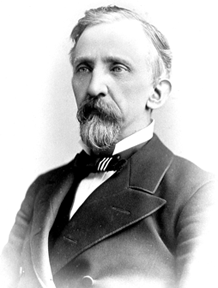Search
John Lester Barstow

Born February 21, 1832 - Died June 28, 1913
John Lester Barstow was an American politician.
Barstow was born in Shelburne, Vermont on February 21st, 1832. At the age of 15, he began teaching at a local school before he moved west to Detroit. By the end of 1857, he had returned to Vermont to help his parents with the family farm.
Barstow took a position as the assistant clerk for the Vermont House of Representatives in Montpelier, Vermont. He was employed in the position when the American Civil War broke out. He enlisted as a quartermaster sergeant, and was immediately commissioned adjutant of the 8th Vermont Infantry. He was given command of Company K as a captain. He was then given a promotion to major. He was held in such high esteem by the men of his unit they gave him a sword on the event of his promotion. They also gave him a second sword when they were mustered out.
During the years Barstow served with the 8th regiment, his health deteriorated. This was more than likely due to the area the unit was assigned, which were the swamps of Louisiana. When he returned to Vermont, for some time he was unable to take part in any business due to malaria related diseases.
In 1864, Barstow was elected a member of the Vermont state legislature. In October 1864, the raid on St. Albans, Vermont occurred. The raid was performed by a group of Confederate soldiers who came down from Canada to attack. Barstow was sent to St. Albans immediately following the attack. He was sent to Canada on a special mission and then was temporarily put in command of a militia created in response to the raid on St. Albans. He was shortly after relived by a Brigadier General George Stannard.
In 1865, Barstow was unanimously reelected to the state legislature and served as the state senator for Chittenden County, Vermont.
In 1870, Barstow was appointed United States Pension agent at Burlington by President Ulysses S. Grant. He held the position for eight years where he made many reforms to the pension program.
In 1880, Barstow was elected the 31st, Lieutenant Governor of Vermont. In 1882, he was elected as the 39th Governor of Vermont. During his time as Governor he called attention to discriminating and excessive rates of transportation. It was during his term in office the Ely Riots, also known as the Ely War, occurred. The riots were put on by miners working in Vershire and Strafford, Vermont. At the time the mines were not as productive as they had been in the past and the price of copper had dropped significantly. Because of this the mines were closed down and a plan was proposed by Smith Ely who owned the mines to continue running the smelters to earn enough money to pay back wages for the mine workers. The workers felt, incorrectly, Ely had amassed personal wealth he could use to pay them. Ely at the time had already spent all of his personal wealth on keeping the mine open. Eventually Barstow had to send in troops to arrest the miners, he was quoted as saying the miners needed to be paid their due. At the close of his term the Rutland Herald wrote about his term "he had been as careful, independent, able and efficient a ruler as Vermont had enjoyed for twenty years."
Barstow passed away in Shelburne, Vermont on June 28th, 1913.
Barstow is believed to have joined the Masonic Fraternity in 1853. His actual lodge affiliation is unknown, although based on where his home was, it was more than likely Washington Lodge No. 3 or another Burlington area lodge. In the 1909 proceedings for the York Rite of Vermont, Barstow is listed as a member of Burlington Chapter No. 3 of Royal Arch Masons.
This article provided by Brother Eric C. Steele.